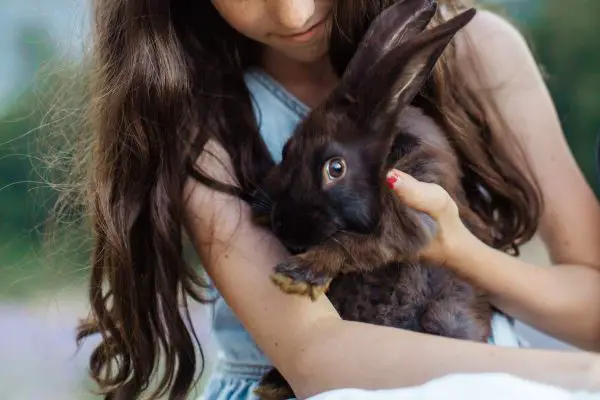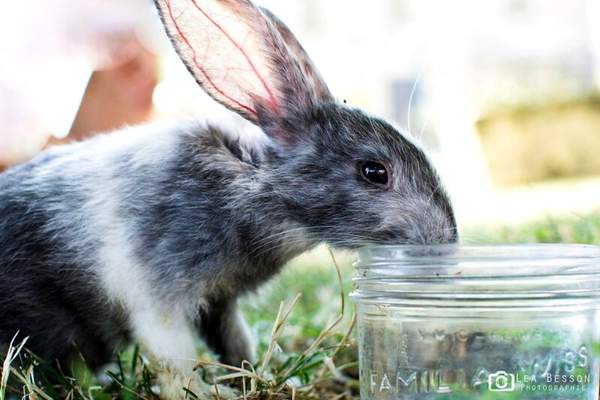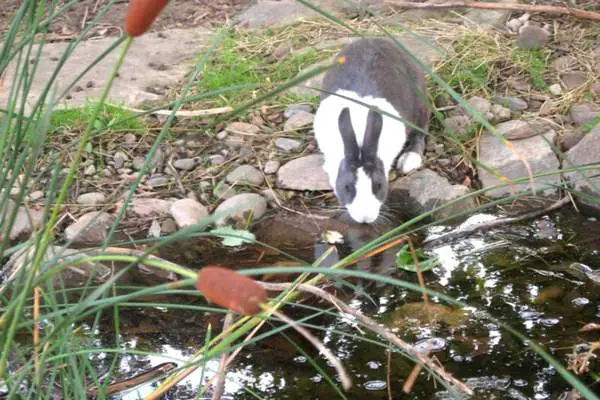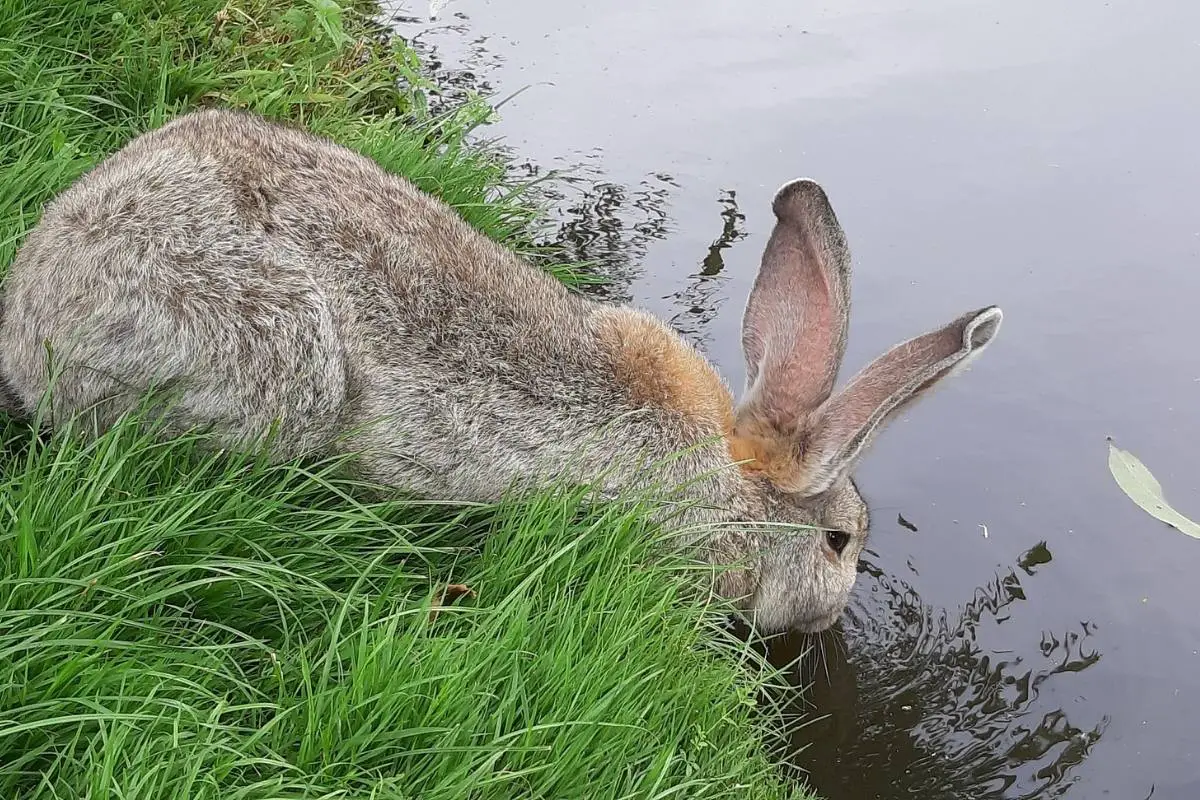Rabbits bring quite a bit to our homes in terms of personality, including many quirks and foibles that we may not always understand, such as noisy drinking. While this behavior can certainly be intriguing, it most likely is nothing to fear.
So, why does my rabbit make noises when drinking? If your rabbit has been making these noises consistently for a while, it may simply be that it very much enjoys drinking. There are many other factors to consider, but it likely is nothing with which to be overly concerned.
This article will discuss how our furry friends communicate with us, their big personalities, some contributing factors that could be driving this behavior, as well as possible illnesses or environmental factors affecting your companion.
Do You Speak Bunny?

Rabbits communicate in a wide variety of ways, through both verbal cues and body language. In the wild, rabbits are prey animals who live within large family-oriented groups called warrens. This means that they need a lot of ways to talk to one another to keep themselves safe from predators.
Many of these communication methods evolved as body language signals, but there are just as many oral emissions with which we should be familiar as well. Often, these signals will appear together when your rabbit is trying to tell you something.
Observing body language cues while listening to the sounds your rabbit is making may help determine why they are being so noisy.
There are many sounds rabbits make to communicate with us, almost all of which are normal and no cause for concern. They can tell us if a rabbit is happy, fearful, in pain, or displaying dominance. Sometimes your rabbit may make “clucking,” or hiccup-like, sounds, or even purring sounds to display contentedness and relaxation.
You may hear honking or “muttering” sounds if your friend is annoyed or unhappy about something, like if you attempted to interrupt play time or have not delivered snacks in a timely manner. Further, your rabbit may grind its teeth loudly if they are in pain or stressed. If you ever hear your rabbit scream or squeal, they are likely in a great deal of pain and need attention immediately.
These are just some examples of the noises your furry friend may make, and it is important to understand the differences in each and to observe your pal’s body language when hearing any noise to determine what it is trying to tell you.
For example, if your rabbit is making purring, slurping, or clucking sounds while it is drinking, and displaying generally relaxed body language, your friend is probably simply happy to be hydrating. Conversely, if your pet seems tense and is making a noise more like wheezing, there may be an underlying illness to address.
Bunny communication savvy aside, it is also important to account for your rabbit’s individual preferences and personality quirks when determining the source of a certain behavior.
Big Personalities, Small Package
Like us humans and almost any other animal, rabbit personalities vary greatly from one individual to another. In fact, with most humans who share their homes with these furry creatures, rabbits have become rather infamous for having large personalities bundled into small packages.
Rabbits can be relaxed, hyperactive, silly, timid, outgoing, and more. The huge array of personalities displayed by each individual rabbit often results in quirks and foibles that can be both entertaining and confusing to a rabbit’s human companion.
Rabbits are extremely social creatures, both in the wild and in our homes, due to their group-living nature. This means that in addition to being just a little needy, they are also quick to talk to us about whatever is on their mind!
Getting to know your rabbit’s preferred communication methods and individual quirks will take time, but eventually you will be able to easily recognize when your rabbit is telling you something.
If your rabbit likes to eat and drink with gusto, it likely will make noises regularly to demonstrate that to you, meaning these noises are nothing to fear. Further, if your rabbit drinks from a bowl instead of a bottle, it may even stick its whole face in the water simply because it is excited or likes the feeling!
Conversely, if your pal is usually reserved and gentlemanly/ladylike during meal or beverage time, a new noise such as teeth-grinding could signal that something is wrong. Beyond personality quirks, considering your cotton-tailed companion’s environment is also important when trying to uncover the drivers of a given behavior.
Environmental Contributors

Environmental factors tend to have a large bearing on how rabbits behave. This is due in part to the rabbit’s nature as a prey animal. They are highly attuned to their environments and always ready to adapt or react to any change in the environment as quickly as possible.
Additionally, rabbits are quite delicate in comparison to other domestic animals like dogs or cats, making them slightly more susceptible to injuries or environmental changes like extreme heat or humidity.
If noise making while drinking is a relatively new occurrence, consider any environmental factors that may be new or different around your rabbit. If you recently moved your rabbit into a new habitat, or moved houses entirely, that could cause stress or anxiety.
If you have introduced new pets into the home and have not conducted a proper warming-up period, your rabbit may be exhibiting stress or frustration. Further, even small changes like a new or different laundry detergent or cleaning agent that makes your house smell differently may be affecting your furry friend.
As discussed above, observe your pet’s other behaviors and cues to determine how they are feeling.
In addition to some of these physical factors, weather could also be affecting your bunny’s behavior. Rabbits are generally well-suited to cold and temperate weather conditions with median to low humidity.
However, if you live in a particularly hot or humid environment, your rabbit might be negatively affected by weather conditions. It might display signs of stress or lethargy, and likely would be compelled to drink much more than usual.
Furthermore, watch how your rabbit is drinking—is it drinking frantically or too quickly? This behavior could cause stomach pain or other issues. Additionally, if the noise you hear while they drink sounds like panting or wheezing, your pal could be overheating and needs attention right away.
If your rabbit seems to be content with its environment but recently began making uncharacteristic noises while drinking, an underlying illness or injury could also be to blame.
Illness or Injury

As mentioned previously, rabbits are quite delicate and as such there are quite a few conditions for which their human companions should be on alert. Rabbits cannot tell us when they are feeling sick or hurt, so it is vital for us to determine their wellbeing through observation of their behaviors.
There are many ways rabbits will let us know if they are ill, and depending on your individual rabbit, this new sound while drinking could be one of them. Some common ailments your rabbit may be experiencing include overgrown or broken teeth, hairballs, myxomatosis (a highly contagious and sometimes fatal virus), or GI stasis (a blockage in your rabbit’s delicate digestive tract).
When determining if an illness or injury is the cause of your rabbit’s behavior, knowing what symptoms to be aware of is important. Below are just a few common symptoms demonstrated by rabbits suffering from some of these common conditions:
- Decrease in appetite
- Uncharacteristic increase or decrease in droppings
- Gait or posture changes (circling gate, hunched posture)
- Dull or missing fur (outside of a molt)
- Head tilt
- Panting or sniffling
- Lethargy
- Teeth grinding
While this list is not all-inclusive it should offer an idea of what to look for if you think illness is driving your furry friend’s behavior. If you suspect your companion is ill, make an appointment with the veterinarian to be safe.
If you have read this far and are still stumped as to why your rabbit is making noise while it drinks, consider its age, size, breed, and/or activity level as additional contributing factors.
Additional Contributing Factors
If your rabbit is healthy and happy and makes noise while drinking water, factors such as age, size, breed, and activity level might be driving this behavior. Observe your rabbit next time it decides to hydrate—in addition to watching its body language and listening for noise, think about some other factors in relation to your rabbit.
Do you have a large rabbit that may need more water than its smaller cousins? If so, your furry friend may be drinking with extra enthusiasm because it is extra-thirsty. Do you have a baby or young rabbit that is still learning?
Your pal may simply be navigating new things or experiences. Is your rabbit extremely high-spirited and active? Like any athlete, your hyperactive companion likely will be especially excited about its water break. None of these factors are cause for concern, they are just more reasons to make sure you understand the needs of your unique bunny.
Conclusion
If your rabbit makes noises while it is drinking, it is likely because it simply enjoys drinking its water. Rabbit communication is varied and complex but knowing what to look for will help determine what factors are driving the behavior.
Chances are your bunny’s individual personality quirks are driving this behavior, but it could also be certain aspects of its environment such as other pets or the weather. Further still, your furry friend might be trying to tell you it is not feeling well, but a vet-check will help in no time.
Finally, account for your rabbits age, size, or activity level when deciding whether to be concerned about the behavior. If your rabbit is happy and healthy and you are in tune with how it likes to talk to you, there is likely no cause for concern and you can get back to enjoying your rabbit’s entertaining quirks.

